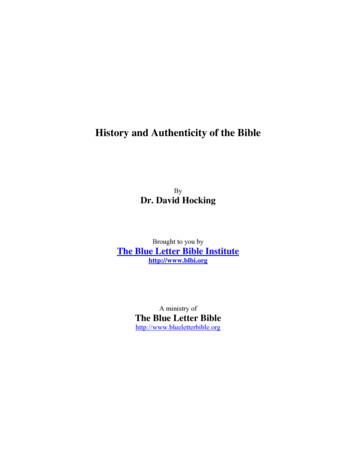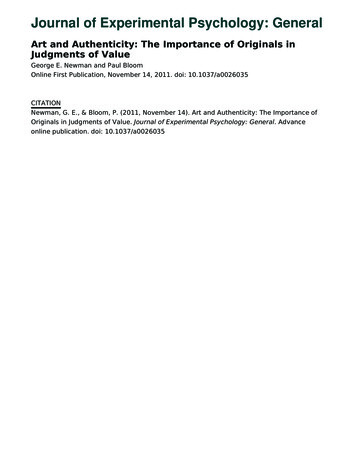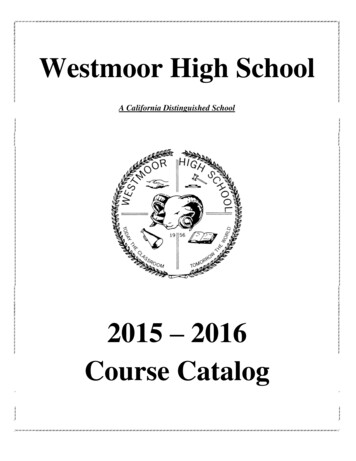
Transcription
History and Authenticity of the BibleByDr. David HockingBrought to you byThe Blue Letter Bible Institutehttp://www.blbi.orgA ministry ofThe Blue Letter Biblehttp://www.blueletterbible.org
Course DescriptionThe History and Authenticity of the Bible, by David HockingThis course was taught during twenty-five classroom sessions with the purpose ofinstructing Bible college students in topics such as the inspiration, the inerrancy, and theauthority of God's Word. The instructor examines how the Bible was written overcenturies of time and how it has been preserved by the Author Himself. He explains theprocess of translations from the original languages; the importance of canonicity; theissues of textual criticism; and the principles of interpretation. This informative serieswill elicit bold confidence in the infallible Word of God.Ages ago someone wisely said, “We cannot dispense with a single word of Holy Writ;the removal of a part would mar the completeness and connection of the whole.Absolutely perfect are the proportions of God’s inspired truth.” That view of the Bible isstrictly adhered to in this course taught by David Hocking. It is available through the textor the audio version, and we encourage you to enroll today.About the AuthorDr. David Hocking is a graduate of Bob Jones University. He has degrees in Bible,Greek, and Ancient History. He received his M. Div. as well as a Ph.D. in Bible Studiesand Languages at Grace Theological Seminary in Winona Lake, Indiana. He has beenteaching and pastoring for over 50 years. His radio ministries have been broadcast fornearly forty years, with the most current program being Hope for Today. He is the authorof more than 35 books including Bible commentaries.David has been married to his wife Carole since 1962. They have three married childrenand six grandchildren. Apart from spending time with his family, he also enjoys speakingat prophecy conferences around the country and guiding tour groups through the HolyLand.Originally Required Reading List – Hocking, H&ADon Stewart, What Everyone Needs to Know about the Bible.Recommended Reading List – Hocking, H&AEvidence that Demands a Verdict, Josh McDowellMore Evidence that Demands a Verdict, Josh McDowellWhat Everyone Needs to Know about the Bible, Don StewartGod’s Outlaw: William Tyndale, Brian Edwards
Systematic Theology, ThiessenA.T. RobertsonNorman GeislerThe Apostolic Fathers, J.B. LightfootThe Rise and Fall of Civilization, David HockingThe ApocryphaWho Is the Messiah? David HockingThe Identity of the New Testament Text, Wilbur PickeringThe Harmony of the Gospels, A. T. RobertsonThe Life of Christ in Stereo, Johnston M. CheneyA History of the Debate Over 1 John 5:7-8, Michael Maynard (out of print)The Encyclopedia of Bible Difficulties, Gleason-ArcherShepherd of Hermas, Charles TaylorThe Teaching of the Twelve Apostles, Roswell Hitchcock and Francis BrownByzantine Text Type, Dr. Harry A. SturzNew Greek Testament According to the Majority Text by Hodges and FarstadWith Christ in the School of Prayer, Andrew MurrayThe Traditional Text of the Holy Gospels, Dean John William BurgonThe Complete Word Study New Testament (Word Study Series), Spiros ZodhiatesPreaching from the Papyri, Herschel HobbsA History of the Jewish People in the Time of Jesus Christ, Emil SchurerEncyclopedia Judaica, Fred SkolnikNotes on the Parables, Richard TrenchNotes on the Miracles, Richard TrenchThe Hidden Pharisees, Elvis RifkinLife and Times of Jesus the Messiah, Alfred EdersheimThe Jewish Book of Why, Alfred J. KolatchThe New Manners and Customs in Bible Times, Ralph Gower
History and Authenticity of the BibleLesson 1Introduction – Part OneByDr. David HockingBrought to you byThe Blue Letter Bible Institutehttp://www.blbi.orgA ministry ofThe Blue Letter Biblehttp://www.blueletterbible.org
Lesson 01HOCKING - HISTORY & AUTHENTICITY OF THE BIBLEIntroduction, Part OnePage 1 of 15The course description says that we are going to talk about how the Bible cameinto existence, the manuscript evidence behind the Bible, and the problems relating to theEnglish translations of the Bible and leading the student to a position of completeconfidence and dependency upon the Bible as the inspired, inerrant word of God. Now ifyou don’t think that is an issue, you are not up to date.In the paper there was an article from Canada in which there was a television talkshow where a fundamentalist preacher, who said he knew the Bible, went on with someof the guys from that Jesus Seminar. They [verbally] slaughtered him. He not only didnot know the Bible—he didn’t know what he was talking about. The result was theprogram concluded that if you are educated and you know the evidence behind the Bible,you know that it is not the word of God. It can be appreciated, but it is not the Bible, forsure. This had quite an impact; in fact, there were more callers than ever before. And thisso-called “fundamentalist” was laughed at and mocked at. He didn’t know what he wastalking about. He didn’t know one thing about what we are going to teach you in thiscourse. Yes, it is important to know what you believe and why.When I was in Sunday school, we used to sing the little chorus: “The B-I-B-L-E,yes, that’s the book for me. I stand alone on the word of God the B-I-B-L-E.” So, if thisis not in your heart, then hopefully by the end of the semester there will not be any doubtin your mind.
Lesson 01HOCKING - HISTORY & AUTHENTICITY OF THE BIBLEIntroduction, Part OnePage 2 of 15Time 02:11Course Objectives1) Learn facts about the existence of the Bibleand the accuracy of the Bible2) Explain the problem of manuscript evidenceand the reliability of the recorded word3) Build confidence in the inspiration andauthority of the Bible4) Answer objections to the inspiration andauthority of the Bible5) Learn to trust the power of the Bible to changethe hearts and lives of peopleNow, our course objectives, we have five of them. One is to inform you as to thefacts behind the Bible’s existence and accuracy. Two is to explain the problem ofmanuscript evidence and the reliability of the written record of the Bible. Three is tobuild your confidence in the inspiration, authority, and accuracy of the Bible. And four isto help you answer objections to the inspiration and inerrancy of the Bible. And five is toencourage you to trust the power of the Bible itself to change the hearts and lives ofpeople.What makes this study more distinct is the systematic teaching of the Bible inwhich our pastors, though maybe not as educated as some, yet were educated in theBible. And we learn the Bible. And we teach that this is the word of God. We tell youwhy it is. But we believe it is the word of God and we are going to show you why in thiscourse. So that when you leave, you will always proclaim the word of God in its powerand in its authority. So, it is a very important thing.
Lesson 01HOCKING - HISTORY & AUTHENTICITY OF THE BIBLEIntroduction, Part OnePage 3 of 15Time 03:15Now the textbook is Don Stewart’s, What Everyone Needs to Know about theBible. You have to read it in its entirety. It’s an important book because it was organizedon this subject. Now some of the material in there needs to be updated which you will getin this course. For instance, I taught this before under a bibliology theme and we nowhave—this whole thing is brand new. That’s how fast things change in terms ofmanuscript evidence. So we will update it. I recommend it highly and of course want youto read it.Now on your general outline, to show you where we’re going with the course onthe History and Authenticity of the Bible, we are going to hit five subjects. First, we aregoing to talk about “The Importance of this Study” as it relates to three different issuesconcerning the Bible. One would be the reliability of the Bible. Two, what we callrevelation—which we will describe what that means—and the results that you can expectby trusting the Bible. So that is kind of the initial deal called, “The Importance of theStudy.”Secondly, we give you information about the Bible: the Old Testament, the NewTestament, as well as the Apocrypha. You will know all of the basic informationregarding that, so you are able to give an answer to those who ask a reason for the hopethat is in you.A third issue is the inspiration of the Bible. Now that becomes a little detailed.We give you a definition that we will want you to know. And we will also present thedifficulties. We do not run away from them here. We do not put our head in the sand andact like it will all go away. We don’t do that. We deal with the problems here. And whenthere are problems, serious problems, we will admit them. We will talk about them and I
Lesson 01HOCKING - HISTORY & AUTHENTICITY OF THE BIBLEIntroduction, Part OnePage 4 of 15Time 04:59will give you a multitude of problems related to “inspiration.” Not to shake up yourconfidence—on the contrary—but to build it so that you are able to give an answer tocritics.The cults love to tear evangelical Christians apart on the authority of the Bible.They do it over and over again. And many Christians are not prepared to answer a thingbecause they have never studied it. Hopefully you will have enough material to be ready.The fourth issue is a tough one. It is called “inerrancy.” The majority ofevangelicals, unfortunately, no longer believe in inerrancy. We are sorry to hear that. Wedo. We believe that. What does that mean? That means we believe the Bible in itsoriginal autographs is totally without error. Well, today that is just being rippedeverywhere. Even among good people who say they love the Bible and believe ininspiration. But as you will learn in this course, you’ve got to watch people. Because theysay they believe the Bible is inspired does not mean they believe what they should. Wewill tell you all the differences relative to “inspiration.” Inerrancy is another subject,although sometimes they are put together and that becomes deceiving.Many seminaries now are no longer having a statement on inerrancy. They arepulling it out. They have had it for years but are pulling it out because they do not want todeal with the problem. So they think that if you take a stand you aren’t going to get manypeople. Well, I can tell you right now, we are not interested in large numbers here. Wereally aren’t. We are not trying to have the biggest school ever in America. We are goingto stand for what is right no matter what. We know what we believe. We are standing forthat and there is no compromise here. The truth of the matter is, what’s important is theword of God. That’s what is important. It’s the heart and soul of this ministry.
Lesson 01HOCKING - HISTORY & AUTHENTICITY OF THE BIBLEIntroduction, Part OnePage 5 of 15Time 06:38We are going to give you what I call the twelve basic principles of theinterpretation of the Bible. That’s to help you get started so you know how to interpret,know how to deal with the problems of interpretation. Because you and I both know thateven in the average church there are people saying, “Well there are many ways tointerpret the Bible.” We will talk about that before we’re done in this course. So that iswhere we’re headed and we’ll start with the importance of this study.Homiletics deals with preaching. Hermeneutics deals with the art ofinterpretation. Hermeneutics is a biblical word, for instance, the spiritual gift ofinterpretation is the word hermeneutic. It is a Greek word set into English and it simplymeans the art of interpretation. We will be giving you twelve principles relating to it thatare basic to take what we have studied in the course and be able to apply it.Also for your library, especially you pastor-types, you will want to pick up anumber of books on inspiration and inerrancy. There are a lot of them. The textbook isDon Stewart’s. That is the only one and I personally still like Josh McDowell’s. They arekind of standards, New Evidence That Demands a Verdict, Volumes One and Two. Thatis where it gets into the details of manuscript evidence. And it is still very, very good, thattwo-volume set by Josh McDowell.All right class, if you have your outline it’s “The Importance of This Study.” Andconsidering the importance of the study, we are going to start right away with reliability.Probably the most important thing about this whole subject because people will say rightoff the bat: “Well, that’s just like any other book. Men wrote that like any other book.”Actually, they don’t even believe that. How do I know? Well, they believe in GeorgeWashington but that’s just in a book. So you understand, the attack which the enemy has
Lesson 01HOCKING - HISTORY & AUTHENTICITY OF THE BIBLEIntroduction, Part OnePage 6 of 15Time 08:28made against the Bible and infiltrated the secular mind (who does not even know aboutthe Bible) is worse than, “Oh, that’s just a book.”See, as an apologist, I could very definitely deal with that if you would just treat itlike a normal book. If we could just apply those simple principles of a normal book to theBible, we would still come out fine. But they don’t do that. It is not just another book tothem, it’s worse than that. They believe it’s a book of myths and fables that they don’tagree with, or that contradicts their lifestyle. They don’t want anything to do with it.There is an attack mode. Have you ever noticed it? You see, the enemy is out to destroyyour confidence in the Bible. He started in the Garden of Eden. He said, “Hath God said,you shall not eat of it, neither shall you touch it, or you’ll surely die?” Eve added thatlittle phrase “touch it.” God didn’t say “don’t touch it.” He said “don’t eat it.” And hestarted planting doubts into Eve’s mind about the authority and reliability of what Godsays.Reliability is extremely important. In fact, there are two issues that you shouldknow about reliability. How reliable is the Bible? How trustworthy is it? Two things:First we’ve got to know how accurate its statements are. You cannot have reliabilitywithout accuracy. And secondly, we have to know how authoritative is its message? Whydo I have to listen to it? I don’t care if it is accurate. It could be accurate and be stupid,foolish, ridiculous message. And it may be accurately reported. So those two issues are apart of reliability.Why should you build your whole life on the Bible? Why should you trust theBible to guide you in everything that you do and say until Jesus comes again? One issueis accuracy. The other issue is authority.
Lesson 01HOCKING - HISTORY & AUTHENTICITY OF THE BIBLEIntroduction, Part OnePage 7 of 15Time 10:20Now how accurate are its statements? Let’s go to Matthew 5. Behind the issue ofaccuracy is the veracity of Jesus Himself. We try to give you in the notes a lot of space soyou can write different things in. But behind accuracy is the veracity of Christ. MeaningHe’s either saying the truth here or He’s not. We are basing what we believe aboutaccuracy on a statement Jesus said in Matthew 5:18.For verily I say to you, [Jesus said in the Sermon on the Mount] ‘tilheaven and earth pass, one jot or one tittle shall in no wise pass from thelaw, til all be fulfilled. (KJV)That sounds pretty reliable to me. That is a very, very strong statement dealingwith the accuracy of the Bible. Everything that it predicts will be fulfilled. And not onejot or one tittle will pass away until it does. So you can count on the Bible doingeverything it says.Now the word jot is the smallest letter in the Hebrew language. Technically it’sthe yodh. You write it in English Y-O-D-H. It is called a jot. It is like the Englishapostrophe, it looks just like that. It’s the smallest of the 22 letters in the Hebrewlanguage. So, how interesting that Jesus would say, not one letter, the very smallest letterwill ever pass away. Now right away you are getting a view of inspiration and inerrancythat is a little deeper than the average evangelical church believes. It isn’t just thethoughts of the Bible. It isn’t just the words of the Bible. It’s the letters also.Do you understand that just slight mistakes here, changes the meaning of words?Now He also said, “not one tittle.” What is a tittle? A tittle is a marking on a Hebrew
Lesson 01HOCKING - HISTORY & AUTHENTICITY OF THE BIBLEIntroduction, Part OnePage 8 of 15Time 12:11letter that distinguishes it from another letter when the two look alike. For instance theletter that is like our English D, daled, looks very much like the R, the resh. It looks verymuch like the same. It’s just kind of at a right angle. But on the daled, the D, the line atthe top goes out just a small tad beyond the line that goes perpendicular to it. The littleextension is called a tittle. A tittle is simply a marking on one letter to distinguish it fromanother letter when the two letters look alike. So talk about a view of inspiration. Jesussaid, “not one yodh—not one smallest letter in the Hebrew language, and not onemarking on those letters will ever pass away until all be fulfilled. That is a pretty detailedview of inspiration.Go to Revelation 19. Every time I turn to this book, I always think in my heart,“Wouldn’t it be great to be looking at this when He comes!” Revelation 19:9. “He saithunto me ” John is being told to write.Write. “Blessed are they which are called to the marriage supper of theLamb. And He saith unto me, ‘These are the true sayings [of Whom?] ofGod.’”Now that is either true or it is not true. Either these are the true sayings of God orthey are not the true sayings of God. The Bible says they are absolutely what God said,accurately reported.People say to me, “Well, there are lies in the Bible.” Well, of course there arebecause every time Satan speaks, it is usually a lie. And by the way, men are recordedand they speak lies. But inspiration does not refer to whether there is a lie in the Bible.
Lesson 01HOCKING - HISTORY & AUTHENTICITY OF THE BIBLEIntroduction, Part OnePage 9 of 15Time 14:02Inspiration refers to whether it is accurately reported as it was told. Whenever Godspeaks, it is the truth of course. But it is all accurately reported—that’s what it means—true, genuine, totally dependable and reliable sayings of God.Look at Revelation 21:5. I like to use these in Revelation because Revelation is amuch debated book as to whether to take it literally or not. Revelation 21:5.He that sat upon the throne said, “Behold I make all things new.” And Hesaid unto me, [He’s reporting what was said to him by God the Father onthe throne.] ‘Write, for these words are true [they’re genuine] and faithful[totally reliable].’”You say, “Well, how do I know that the guy accurately reported that?” That is partof the problem that is discussed in this course. Revelation 22:6. I just want you tounderstand the importance of this study at this point and what the Bible actually says.You may not agree with what the Bible says but at least be honest enough to admit thatthis is what it says. In chapter 22, verse 6, “He said unto me these sayings are faithful andtrue.” There it is again. We have a totally reliable record given to us.Now we are going to deal with that issue in a moment before we are done. We aresimply just starting out. What is reliability? What does that mean? How trustworthy is theBible? It deals with the accuracy of its statements. Are they reliable? Are they genuine?The Bible says they are. You say, “That is the Bible talking about itself.” And that is afunny thing to me about people. In their attacks on the Bible, they are scared of internaltestimony. They are scared of it. They say, “Oh, the Bible is saying that about itself. How
Lesson 01HOCKING - HISTORY & AUTHENTICITY OF THE BIBLEIntroduction, Part OnePage 10 of 15Time 15:51do you know that’s true?” Oh well then, we can’t apply internal evidence to any book canwe, under those terms? If that is so, then we have to apply external evidences to theaccuracy of the Bible. Would you like to know what the external evidences are to theaccuracy of the Bible? The answer is “no,” they don’t want to know it. Why? Becausethere is no book in the entire world that can stand the test that the Bible can on externalevidences. And we will show that to you before we are done with this course.So you see, the very testimony of the Bible itself is clear. It is telling you “this istotally reliable.” It reports God saying it. The veracity of Jesus is here. He said that noneof it will pass away. It will all be fulfilled. In Matthew 24, He said, “Heaven and earthwill pass away, but My words will never pass away” (Matthew 24:35).Now, how authoritative is its message? I was witnessing to a guy on the Bible andhe was so hostile I said to him, “You know I’m learning in old age to be a little morerelaxed, but I do get uptight. I love this Book.”So anyway, he is just telling me all that is wrong with it and I said, “Can I ask youa personal question?He said, “Sure. What?”I said, “What have you got against this Book?” I mean he was waxing soeloquently about what he thought was wrong with the Book. You know, I had not donethat tactic before, but I was just kind of frustrated. I didn’t want to get any angrier than Ialready was. So I just said to him, “What is it that you have against this Book?”He thought for a minute and he said, “I have read it.”I said, “I’m glad you have, but you are certainly against it.”He says, “It is the way the Book writes.”
Lesson 01HOCKING - HISTORY & AUTHENTICITY OF THE BIBLEIntroduction, Part OnePage 11 of 15Time 17:35I said, “What do you mean the way?”He says, “It acts like it is the authority, like you’ve got to do what it says.”And I smiled at him and I said, “You know I cannot find a finer testimony for theauthority of the Bible than what you just gave. I want to thank you for that.”“I don’t want to give any testimony,” he said.I said, “Well, you just did.”Yeah, I can understand that very, very much. The Bible tells you what to do andacts like it is the authority and you are not. And you see the carnal nature that we have,the depravity that we have, we fight that, man. “I don’t want anybody telling me what todo.” But just to emphasize that for you, when it [the Bible] says: “Thus saith the Lord.”Now some book I read had [listed] five thousand times that this was said. Please beaccurate. Don’t say that to people. Anybody can get the trusty computer out and findwhat it is. It actually says it 415 times.You see how we lose credibility when we do not say what is true. We are quotingsomebody and all this business of what the Bible is or it isn’t. Please quote accurately anddon’t quote something from somebody that you haven’t also seen the evidence for. Thisis very important.All I am trying to say is that these are phrases that are used in the Bible to indicateits authority. In other words, God said this, you do this. “The word of the Lord said it isspoken it is written.” That is how authority is developed.What I want you to understand is be accurate. Don’t quote those figures that youread in some books on this. And it is done constantly. Look it up yourself. You do not
Lesson 01HOCKING - HISTORY & AUTHENTICITY OF THE BIBLEIntroduction, Part OnePage 12 of 15Time 19:14need to trust the notes in the syllabus, look it up yourself. And who cares whether it isone or two off, but just do not say “five thousand.” Bad mistake!Now when you talk about authority, authority in this Book, why is it authoritativeand therefore totally reliable? And the answer is: “because it is the word of God.” Flatout. Do you know that if it is the word of God and God is who He is, according to thisword, then He would not make a mistake? He could not. It would be impossible for Himto do so. The next argument is: “Well, but the guys who wrote it down could makemistakes.” And do you know something? That is true. So in our course, we have to lookat all of that.There is not a book that is extant, which means it was not printed or publishedbefore we had the printing press. Those extant copies of other manuscripts are far moreerror-filled than the Bible ever was by hand copying it. Some people quote things like,“Oh there’s over 500,000 variations of the original text of the New Testament.” No, thereis not. But people say that. I had a guy throw that up to me and he listed them all. So Iwent back and looked them all up myself. First of all, half of what he put down was nottrue at all and the other half were simply repeating the same error in multiple copies ofthe same passage. So you understand that if a guy made a mistake—wrote down oneletter different than another letter—and all the copies that were made off of his copy, thatwould repeat the same error, wouldn’t it? If there were 50 copies, so are there 50 errors?No, there is just one. Are you following me? So the total number of those things is soridiculously low, there is no document in all of ancient history that can even comparewith the accuracy of the Bible. And it is amusing to me how we allow this argument to goon and on. It is like, “Oh boy, yeah, he’s into that human author thing. I don’t know what
Lesson 01HOCKING - HISTORY & AUTHENTICITY OF THE BIBLEIntroduction, Part OnePage 13 of 15Time 21:16to say now.” “Well, they were unusual men, you know.” No they weren’t. They werejust as crummy as you are. You know, they are fallible. They can make mistakes. And sowe have to deal with that. We have to deal with the transcribing of the documents. Youknow, that is very important.I hear people say, “Well, the Jews did not make any mistakes.” Yes they did.They made fewer mistakes than Gentiles because they had a reverence for the Bible thatmaybe the Gentile did not have and the Jew had a fear of making a mistake. But they stillmade some mistakes. In the manuscripts there are some differences. Not many. But thereare some.Now I don’t know whether you are getting shaky or not right now. But I havefound something in my life: “the truth will set you free.” Don’t hide from the truth. Weare going to expose probably a lot of myths that you have heard from preachers. All wellmeaning, but we are going to have to deal with them because they are not always thetruth. So, if I ask you, “what’s the key to the reliability of the Bible?” There are reallytwo issues: The accuracy of its statements and the authority of its message. There is nobook that has ever been written—and I have read a lot of religious statements, I’ve readcult books too—but there is no book that talks like the Bible. You talk about authority.There aren’t any options here. There aren’t creative alternatives and suggestions. He justsays, “Do it. This is My word, now do it.” The Bible expects us to obey it. Why?—because it is God’s word!Now, listen carefully. I don’t make it the word of God. It already is the word ofGod. It doesn’t become the word of God by the way I teach it. It already is the word ofGod. You can shout and scream and yell and say “I really believe this with all my heart.”
Lesson 01HOCKING - HISTORY & AUTHENTICITY OF THE BIBLEIntroduction, Part OnePage 14 of 15Time 23:06Well, we are glad you do, but that has nothing to do with whether it is the word of God.“But I believe it and that settles it.” No, it doesn’t. The guy who believes in Buddha couldsay the same thing. “I believe that Buddha lives. He lives within my heart.” Well, I amglad you feel that way, but I don’t believe he does. I may believe you believe it, but Idon’t believe what you believe.Is everybody following that? Okay, you understand this? This is a very importantissue. We will not run away from the problems and the details of this. It is no threat at all,none whatsoever. But it is to a lot of Christians because they do not know how to handleit. One thing is for sure: the Bible claims to be accurate in its statements. One thing is forsure: the Bible claims to be authoritative in everything it says. This is God’s word andyou better shape up!The carnal man does not want to hear that. We want to do what we want to do.We don’t want anybody telling us what to do. Well, the Bible sure tells us what to do.And that is the reliability issue. I trust it because it is the word of God. If I did not believethis was the word of God I would not be sitting here teaching this course. I’ll tell you thatright now, I would not waste the time with it. I would not want to preach anymore either.I would not want to go into the pulpit doubting that this is the infallible word of God.That is the key to biblical preaching and teaching—what a man believes that Book isreally all about. I believe it is the power of God unto salvation to everyone who believes.I do not make it powerful. It already is the power of God. That is a wonderful Book, isn’tit? I love that Book. And it is so important that we get this straight.Let’s Pray,
Lesson 01HOCKING - HISTORY & AUTHENTICITY OF THE BIBLEIntroduction, Part OnePage 15 of 15Time 24:43Father I thank You for Your word. I thank You that we can haveconfidence in this Book. It is the word of God that liveth and abidethforever. And I pray that You will help us as we go through this course.Lord, it breaks our hearts to see how the enemy in his strategy hasblinded the minds of them that believe not. It breaks our hearts to seefriends and relatives and loved ones who simply will not open theirminds to the truth. God You must do that. You opened the heart of Lydialong ago (Acts 16:14). You can open anybody’s heart. You have thepower Lord. We need You. Salvation is of God and not of man. We areborn of the Spirit of the living God and Lord I pray that You wouldteach us throughout this course to trust You to break the bondage ofblindness that is on the unbelieving heart. Thank You, Lord, in Jesus’name we pray. Amen.
History and Authenticity of the BibleLesson 2Introduction – Part TwoByDr. David HockingBrought to you byThe Blue Letter Bible Institutehttp://www.blbi.orgA ministry ofThe Blue Letter Biblehttp://www.blueletterbibl
Course Description The History and Authenticity of the Bible, by David Hocking This course was taught during twenty-five classroom sessions with the purpose of instructing Bible college students in topics such as the inspiration, the inerrancy, and the










